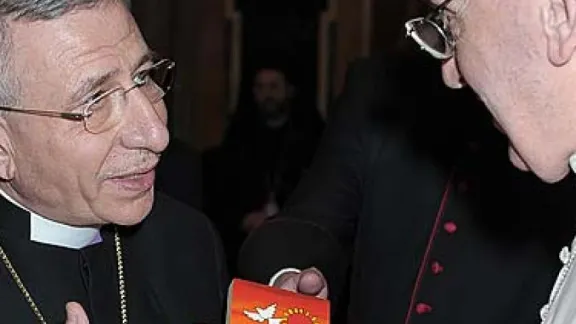
LWF President Bishop Dr Munib A. Younan presents Pope Francis with a Salvadoran cross during a March 2013 audience. © Servizio Fotografico
LWF President Reflects on Pope Francis’ Visit to the Middle East
(LWI) - The Lutheran World Federation (LWF) President Bishop Dr Munib A. Younan was among the delegation of church leaders who accompanied Pope Francis during his three-day visit to the Middle East from 24-26 May. The pontiff attended more than 30 events in Jordan, Palestine and Israel, and on Sunday secured a promise from Israeli President Shimon Peres and Palestinian Authority President Mahmoud Abbas to meet with him at the Vatican in June to pray together and talk peace.
“Here, at the birthplace of the Prince of Peace, I wish to invite you to join me in heartfelt prayer to God for the gift of peace. I offer my home in the Vatican as a place for this encounter of prayer,” he said.
In his speech to Peres and the Israeli government, the pope also stated: “building peace is difficult, but living without peace is a constant torment.”
Following the visit, Younan, who is Bishop of the Evangelical Lutheran Church in Jordan and the Holy Land, reflected on Pope Francis’ meeting with the Palestinian Authority and particularly the mass that was held in the Manger Square.
The mass gave the Palestinian people—“both Christians and Muslims a feeling of hope. To see that the President, the Prime Minister, the Ministers, Heads of Churches, all of these people attending, with locals, with people from Galilee, with people from all over the world—over 10,000 people in the Manger Square—raised the morale of the Palestinian people,” Younan said. “While we are under occupation, we need a leader to show that the world is listening and hearing us and I believe that Pope Francis showed this to our people.”
During the visit, Younan said, the pontiff called for a two-state solution with each state having internationally-recognized borders. This call echoes the LWF Council resolution from June 2013 on the relation between Israel and Palestine. The resolution called upon LWF member churches to advocate for a halt to “expansion and creation of settlements” and for an immediate resumption of peace talks that should lead to resolving the final status question about the conflict, end the occupation, and enable a viable Palestinian state alongside Israel, with peace and security for both Israelis and Palestinians.
As well as visiting key sacred places in the old City of Jerusalem such as the Al Aqsa mosque compound and the Dome of the Rock, the pope stopped to pray in Bethlehem at a section of the Separation Wall near Rachel’s Tomb.
Younan stressed the importance of the pontiff not only meeting officials during his visit but being exposed to the reality of the people. “The reality is that there is a wall that separates Palestinians and Israelis, Palestinians and Palestinians, and Palestinians from their land,” Younan said. “Pope Francis, I believe, prayed that this wall would no longer exist and I say this prayer with him. And I hope that all people of good conscience would pray with him that this wall would no longer exist, that this wall of hatred would fall and become a bridge of justice and reconciliation between Palestinians and Israelis alike.”
“The Pope understood the complexity of the situation, especially when speaking with Palestinian families during a lunchtime visit in Bethlehem,” Younan said. “It is important to me that the Pope saw the issues that the Palestinian people are dealing with.”
Younan also appreciated Pope Francis’ words to the Christian population in the Middle East during his visit. “Pope Francis said very clearly that the Christians who have been witnessing in the Middle East for over 2,000 years in sometimes difficult situations are important, they play integral roles in their societies, and that their role in this part of the world should not be overlooked,” Younan said. “I believe this gives even more importance to supporting Arab Christians who are witnessing in the Middle East.”
Younan also underlined the ecumenical importance of the pope’s visit. “In the Holy Sepulcher, the meeting with the Ecumenical Patriarch has given a boost to ecumenism in Jerusalem. In Jordan, King Abdullah II gave a speech on Muslim-Christian relationships and the importance of Jordan’s role in facilitating those relationships. At the Haram esh-Shariff, this spirit of mutual trust was on full display in the meeting between Pope Francis and the Grand Mufti of Jerusalem. It has given a boost to Muslim-Christian relations and I hope this meeting will help to overcome Islamophobia around the world. At the same time, I hope that the meeting between Pope Francis and the two chief Rabbis of Israel on the Jewish side, will help in the fight against anti-Semitism as well as give a boost to Christian-Jewish relations,” Younan said.


